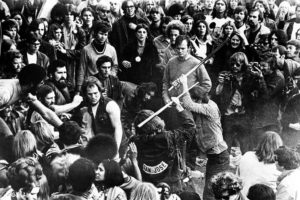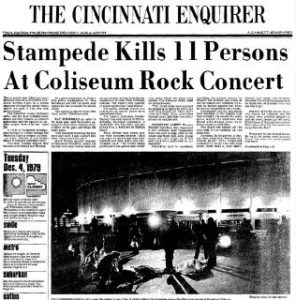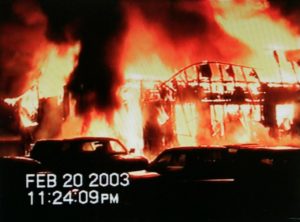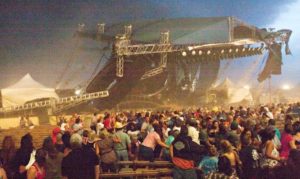by Gary Chapman
It’s been a while since most of us have been to a concert. As concerts start to open back up, with rules that change how the venues work, you get to think about previous events that have changed concerts. Here’s some of the ones that have changed concerts fundamentally.
- The Altamont Speedway Free Festival
In Dec. 1969, as a follow up to Woodstock, a festival was held at  San Francisco’s Altamont Speedway. The show was headlined by Santana; Jefferson Airplane; The Flying Burrito Brothers; Cosby, Stills, Nash, and Young; Grateful Dead and the final act being the venerable Rolling Stones. The security for the festival was the local chapter of the Hell’s Angels, with them being paid for, according to the president in the documentary Gimme Shelter, $500 worth of beer. The Angel’s job was to make sure that the place was safe and to serve as a barrier between the stage and the large crowd.
San Francisco’s Altamont Speedway. The show was headlined by Santana; Jefferson Airplane; The Flying Burrito Brothers; Cosby, Stills, Nash, and Young; Grateful Dead and the final act being the venerable Rolling Stones. The security for the festival was the local chapter of the Hell’s Angels, with them being paid for, according to the president in the documentary Gimme Shelter, $500 worth of beer. The Angel’s job was to make sure that the place was safe and to serve as a barrier between the stage and the large crowd.
The concert started smoothly during Santana’s set, with it turning ugly during the other sets (except the Flying Burrito Brothers). The Hel’s Angels were aggressive with the crowd and the performers. With the lead singer of Jefferson Airplane being knocked out and Stephen Stills reportedly being stabbed in the leg. Grateful Dead, hearing about the ruckus, did not go on the stage that night.
When the Rolling Stones went on after sundown, three to five thousand people ran up to the stage. Reportedly, after coming off his helicopter, Mick Jagger was punched by a concert goer. During the performance of their 1966 song, “Under My Thumb”, a concert goer named Meredith Hunter was trying to get on stage and brandished a gun; a Hell’s Angels memeber proceeded to stab him five times and he was allegedly being stomped on by the Angels. Hunter was under the influence of meth at the time of his death.
While it is understandable why they intervened, it could’ve been different. Other people had died, with two dying in a hit and run and a person drowning in an irrigation ditch while on LSD.
The festival is considered Rock and Roll’s worst day. According to a former FBI Agent and the BBC, The Hell’s Angels did try to kill Mick Jagger over his lack of support, but failed when their boat sank.
Rolling Stone, in their 1970 article about the event, said that, “Altamont was the product of diabolical egotism, hype, ineptitude, money manipulation and, at base, a fundamental lack of concern for humanity,” and that, “If the name ‘Woodstock’ has come to denote the flowering of one phase of the youth culture, ‘Altamont’ has come to mean the end of it.”
2: The Who Concert Disaster
On Dec. 3, 1979, The Who was scheduled to be playing at Cincinnati’s  Riverfront Coliseum (now called the Heritage Bank Center). About 18 thousand tickets were sold and about 14 thousand were first come-first served, also known as festival seating.
Riverfront Coliseum (now called the Heritage Bank Center). About 18 thousand tickets were sold and about 14 thousand were first come-first served, also known as festival seating.
People lined up before the concert and a large crowd was there at 3 p.m., where a local radio station said they would let in the general admission ticket holders. At 7:10 p.m., they opened two doors on each side, rather than all the doors for the over 7,000 people waiting. People heard either a late soundcheck or the movie “Quadrophenia”, causing many to think the show started and a large crowd formed.
People were trampled and 11 died. The band did play that night, as they were not informed of what happened until after the show. On Dec. 27, the city of Cincinnati banned unassigned seating, which they kept until 2004, when they repealed it.
The Who did plan on going back to Cincinnati in 2020, with Pete Townshend saying that, “we need to go back to Cincinnati, you know, we do. As soon as we can. It would be such a joyous occasion for us, and such a healing thing,” and that, “I’m not forgiving us. We should have stayed.” The 2020 concert was postponed, however, due to the COVID-19 pandemic.
3: The Station Nightclub fire
The Station was a nightclub in West Warlick, R.I., and on the night of  Feb. 20, 2003, the ‘80s rock group, Great White, was playing. During the first song of the set, “Desert Moon”, pyrotechnics were lit that ignited the acoustic foam on the ceiling, causing flames to quickly spread across the building.
Feb. 20, 2003, the ‘80s rock group, Great White, was playing. During the first song of the set, “Desert Moon”, pyrotechnics were lit that ignited the acoustic foam on the ceiling, causing flames to quickly spread across the building.
People quickly ran to the exit of the building and subsequently got stuck in the doors. People were also crushed as black smoke poured out of the building. The band quickly exited the stage with the lead singer saying, “Wow… that’s not good.”
People who tried to use the band exit were stopped by bouncers, others had to break windows to get people out. 100 people died from the fire and 230 non-fatal injuries were reported. Among the dead was guitarist Ty Longley and WHJI FM MC Mike “The Doctor” Gonsalves, who is believed to have went in to salvage the equipment from the flame.
The whole incident was caught on video by WPRI cameraman Brian Butler, who was there to shoot b-roll for a piece that was, ironically, about nightclub safety as there was a stampede a few nights before in Chicago. In a conflict of interest, the person who was going to deliver the piece was a co-owner of The Station.
It was revealed by the National Institute of Standards and Technology that there was no sprinkler system in the building, which it was required to have as a venue. The owners and the band manager were charged with 200 counts of involuntary manslaughter. The band manager pled guilty to 100 counts and was sentenced to 10 years in prison but was paroled in 2008.
The co-owners pled no contest and were sentenced to 15 years and 10 years respectively.
This event taught people to be wary about venues.
- Columbus Nightclub shooting/The death of Dimebag Darrell
On Dec. 8, 2004, the band Damageplan was playing at the Alrosa Villa nightclub in Columbus, Ohio. During the first song of the set, Nathan Gale walked on to the stage and shot guitarist “Dimebag” Darrell Abbott four times at point blank. Gale killed four others before being shot by Officer James Niggemeyer with a shotgun. According to his mother and others, Gale was discharged from the Marine Corps due to being diagnosed with paranoid schizophrenia. He was obsessed with Pantera, another band that Dimebag was a prominent member of. According to some, Gale believed that Pantera was trying to steal his identity.
in Columbus, Ohio. During the first song of the set, Nathan Gale walked on to the stage and shot guitarist “Dimebag” Darrell Abbott four times at point blank. Gale killed four others before being shot by Officer James Niggemeyer with a shotgun. According to his mother and others, Gale was discharged from the Marine Corps due to being diagnosed with paranoid schizophrenia. He was obsessed with Pantera, another band that Dimebag was a prominent member of. According to some, Gale believed that Pantera was trying to steal his identity.
After this, concert security was heavily beefed up with no one other than a select few accessing the stage during play. Scott Ian of Anthrax said after his death that, “To me, everything changed after [Abbott] was killed. The stage became off-limits for everyone but musicians. I don’t give a f**k how much fun you’re having. Stay the f**k off the stage.”
Pantera advocated for more safety after up-and-coming pop star Christina Grimmie was murdered in 2016 during a meetup. They posted on their facebook page that, “After Dime’s murder, we all prayed that our industry (i.e. club owners & promoters) would do whatever they needed to do to protect artists from gun wielding fanatics. Sadly, that’s not the case and another rising star had to pay the consequences with her life. SOMETHING NEEDS TO CHANGE! RIP Christina & RIP Dime, Jeff Thompson, Erin Halk and Nathan Bray.”
5: The Indiana State Fair stage collapse
On Aug. 13, 2011, thousands of people crowded the grandstand for a c oncert headlined by country music duo, Sugarland. Bad weather was expected for the region, they were expecting hail and a possibility of tornadoes. The opening act went on as expected, and they were going to call it off at 8:45 p.m., but at 8:46, a strong, almost 60 MPH gust of wind hit the stage, causing the roof of the temporary stage to collapse. It fell onto the front row, killing 7 and injuring 58.
oncert headlined by country music duo, Sugarland. Bad weather was expected for the region, they were expecting hail and a possibility of tornadoes. The opening act went on as expected, and they were going to call it off at 8:45 p.m., but at 8:46, a strong, almost 60 MPH gust of wind hit the stage, causing the roof of the temporary stage to collapse. It fell onto the front row, killing 7 and injuring 58.
According to the engineering firm Thornton Tomasetti, the cause was, “due to the inadequate capacity of the lateral load resisting system, which was comprised of guy lines connected to concrete ‘Jersey barrier’ ballast.”
It was determined that the State Fair Commision was not adequately prepared, but did commend the response.
In conclusion, as concerts have opened up with changes in protocol, you should keep in mind the things that have set regulations and remember that regulations are often written in blood.




